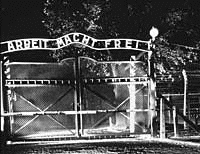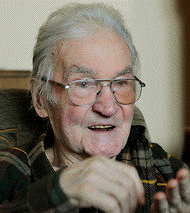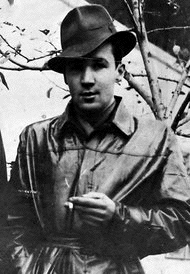
October
23, 2011
By DENNIS
HEVESI
Jerzy
Bielecki was 19 years old, Roman Catholic and suspected
of being a member of the Polish resistance when he was
arrested by the Nazis in June 1940 and transported to
Auschwitz,
where the number 243 was tattooed on his arm.
Nearly
three years later, Cyla Cybulska, her parents, her two
brothers and her younger sister were crammed into a train
with thousands of other Polish Jews and shipped to
Auschwitz. Only Cyla --No. 29558-- would survive. Because
of Mr. Bielecki.
|

|
|
|
Jerzy
Bielecki in 2010.
|
Theirs was a tale of love and courage that would
continue to resonate despite the nearly 40 years during
which they were separated, both believing the other had
died.
For
his daring rescue of that one Jewish woman, Mr. Bielecki
was recognized in 1985 as one of the so-called righteous
gentiles by Yad Vashem, Israel's center for Holocaust
research and education. He died Thursday at 90 in Nowy
Targ, Poland, said Stanlee Stahl, executive vice
president of the Jewish Foundation for the Righteous,
which assists non-Jews who risked their lives to save
Jews.
Mr.
Bielecki --known as Jurek-- was in forced labor in a
grain warehouse at the concentration camp when several
young women were herded through the door in the fall of
1943. "It seemed to me that one of them, a pretty
dark-haired one, winked at me," he told The Associated
Press last year. "It was Cyla, who had just been assigned
to repair grain sacks."
Over
the next eight months, although able to exchange only a
few furtive words each day, they fell in love.
Mr. Bielecki began planning their escape. Aided by a
fellow inmate working in a uniform warehouse, he began
piecing together an SS guard's uniform. He obtained a
stolen pass and a forged document authorizing the
purported guard to take a prisoner to work at a nearby
farm.
|
|

|
|
Mr.
Bielecki as he looked about 1944 or 1945, after
incarceration in the Auschwitz camp.
|
On July 21, 1944, Mr. Bielecki led Ms. Cybulska out of
her barrack and onto a long path leading to a side gate
where a sleepy guard said, "Ja" --yes -- and let them
pass. Hiding in the fields during the day, they walked
for 10 nights until they reached the home of one of Mr.
Bielecki's relatives. Though much in love, Mr. Bielecki
decided that he had to join the Polish underground. He
found a hiding place for Ms. Cybulska with a Polish
family.
They
would not see each other again for 39 years. "Through a
variety of misunderstandings each thought the other
died," Ms. Stahl said.
Ms.
Cybulska would immigrate to the United States, marry
another Holocaust survivor, David Zacharowicz, and
eventually open a jewelry business in Brooklyn. In
Poland, Mr. Bielecki started a family of his own and
worked as the director of a school for car
mechanics.
It was
pure chance that in 1983 they would find each other
again. By then, David Zacharowicz had died. "Cyla was at
home talking to the Polish woman who cleaned for her,
telling how this man had saved her and that she had been
told he had died," Ms. Stahl said. "The cleaning lady
said: 'I don't think he's dead. I saw a man telling the
story on Polish television. He's alive.' "
Ms.
Zacharowicz tracked down Mr. Bielecki's phone number in
Nowy Targ one morning in May 1983 and several weeks later
flew to Krakow to meet him. When she stepped off the
plane, he handed her 39 red roses, one for each of the
years they had not seen each other.
"He
and Cyla saw each other about another 15 times," Mr.
Stahl said. "They were good friends for life."
Mr.
Bielecki was born in Slaboszow, Poland, on March 28,
1921. Ms. Stahl said she did not have information
about his survivors.
In an
interview with The Associated Press last year, Mr.
Bielecki said he was "very much in love with Cyla,"
adding: "Sometimes I cried after the war, that she was
not with me. Fate decided for us, but I would do the same
again."
Cyla
and David Zacharowicz had one child, Fay Roseman of Coral
Springs, Fla. "My mother died in 2005. I have two
children," Ms. Roseman said Friday. "Without him,
there wouldn't be this family."
